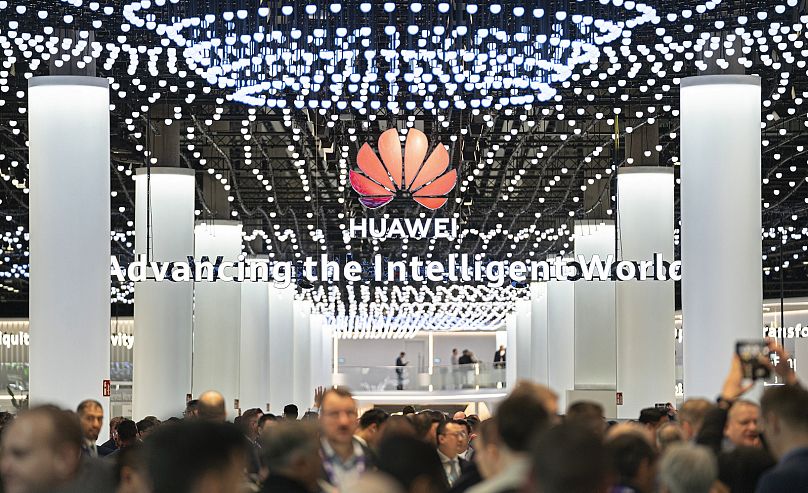What are the biggest takeaways from Mobile World Congress 2024? Euronews Next's editor talks generative artificial intelligence (genAI) and China.
Why should we all care about artificial intelligence (AI)?
The question swirled around my brain all week this week as I trudged back and forth through the crowds in the cavernous halls of Barcelona’s Gran Via exhibition centre for Mobile World Congress (MWC).
One noticeable thing at this year’s gargantuan tech fair, besides the throbbing pains in the balls of your feet, is the omnipresence of the letters "AI" in bright lights and emblazoned on billboards, company stands, and merch.
But beyond the tech bubble, are the discussions around AI cutting through to the outside world?
Over a drink with a communications director for one of the Big Tech giants who was attending the event, the topic of conversation ultimately switched to AI and how hard it was to engage people into actually giving a damn.
We reasoned that it was often gimmicks that grabbed people’s attention, rather than the potential impact of the tech itself.
For those that aren’t clued already in, confused by the meteoric rise of chatbots like ChatGPT, or gripped by the anxiety of it replacing you, AI is perhaps still only in your periphery.
One of the big things I’m taking away from MWC this week, however, is how quickly that blissful ignorance is set to change for most of us.
The mobile devices you have in your pockets, for instance, are the latest testing ground for the technology, and the advances to keep up with the already fast-paced release of the latest generative AI innovations are frankly staggering.
In the same way that landmark events like the arrival of the first iPhone changed the industry forever, AI will drastically change how we interact with our mobile devices.
GenAI integrations in handsets, for instance, will enhance user experiences, not only by giving people greater freedom to carry out tasks but also with the capability to create quality content (from images, photos and text) on their devices on the go.
Eye-tracking tech on your device will allow you to answer calls or open messages when you’re out for a run or cooking almost instantaneously with just your sight, or over time through AI, learning to recognise your intentions by opening notifications or apps for you while your hands are preoccupied.
Chinese companies out in force
Of course, how these things are enabled by wireless connectivity through the cloud will depend on the reach and efficiency of the 5G network.
Despite heralding advances in connectivity, the roll-out of 5G stalled somewhat during the COVID-19 pandemic which means its promised potential hasn’t been fully harnessed.
But according to the annual Mobile Economy report published on Monday by MWC event organisers GSMA, 5G will account for more than half of all mobile connections by the end of the decade.
Who the required infrastructure is built by remains a big question mark, with continuing discussions around an open radio access network (oRAN) to allow - despite some obvious cons - for market competition to flourish and avoid the overreliance on a single vendor.
This is an obvious response to Chinese telco companies in particular and their pitch to build the required infrastructure to facilitate the 5G transition.
Weariness around Chinese technological advancements and simmering geopolitical tensions around trade and competition have done little to dampen China’s presence at MWC, however.
One Asian telco company I spoke with pointed to the fact that a lot of telecommunications manufacturing was being moved out of the country in favour of other regional rivals like Vietnam because of the instability. US trade restrictions on exports, particularly on technology, partly over fears of intellectual property theft, also continue to be indicative of the current chill in relations with China.
If any of this was an issue, no one told the Chinese themselves who, unfazed by the geopolitical and economic situation, were out in force.
Huawei, which is rebuilding after the impact of US sanctions and restrictions or bans on their technology across the EU, was by far the biggest exhibitor at the event.
Our team was told it would take at least half a day to explore their stand which alone took up most of one of the exhibition centre’s eight halls.
Xiaomi, Honor, ZTE, China Mobile, and China Telecom all occupied prominent booths in the exhibition spaces with new product launches coming thick and fast.
Broadly speaking, they continue to be the dominating force in the telco market as some of its biggest players regardless of the current headwinds.












